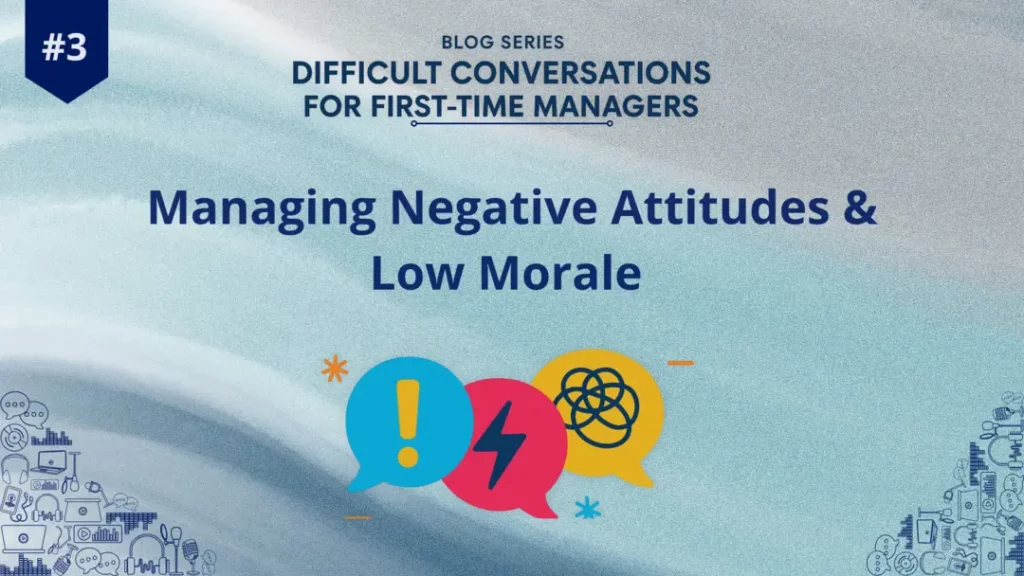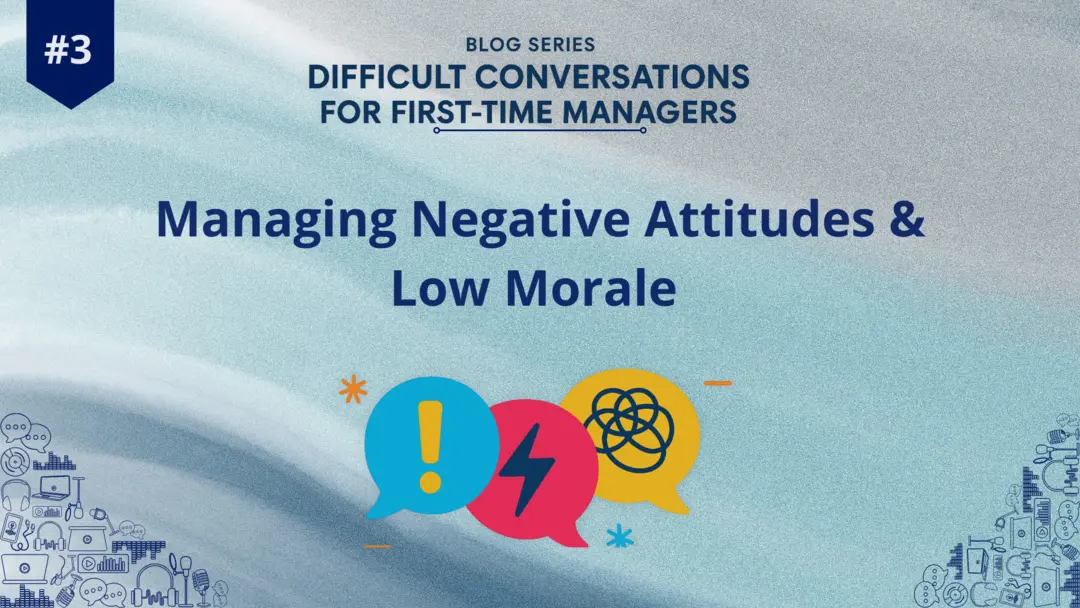“Low Morale Isn’t Loud—It’s Quiet, and It’s Dangerous”


What if your team isn’t just tired… but quietly giving up?
Imagine walking into your office and instead of the usual buzz of energy, you’re met with silence. Blank stares. That weird invisible wall that says, “Something’s off.” Work’s still getting done—but just barely. There’s no spark, no curiosity, no camaraderie. It’s like everyone’s running on autopilot with a low battery.
You brush it off. “Maybe it’s just a rough week,” you tell yourself. “They’re probably dealing with deadlines, personal stuff, or that never-ending flu.” But what if the problem is something else?
What if you—without meaning to—have become part of the reason morale is dipping?
Let’s get honest for a moment.
As a first-time manager, it’s tempting to focus on KPIs, project deadlines, and process improvements. But managing energy? Motivation? Team vibes? That’s the real test. And here’s the uncomfortable bit: tackling negativity isn’t fun. It’s awkward. You don’t want to sound like you’re nagging or micromanaging. But you also can’t afford to let the team spiral.
So how do you walk that tightrope?
Let’s unpack it.
First, Where Does Negativity Even Come From?
Negativity isn’t loud. It’s subtle. It creeps in quietly—through eyerolls in meetings, late deliverables, or that “meh” tone when someone says “I’m fine.”
It’s not about one bad day. It’s usually the result of deeper, long-standing issues.
Here are a few of the usual suspects (especially in Indian workplaces):
1. Lack of Recognition
“I’ve been putting in late nights, fixing bugs, mentoring juniors—and still, not even a ‘thank you’.”
Many workplaces in India run on the belief that “your work should speak for itself.” Problem is that silence doesn’t motivate. Even the most committed employees need a little validation.
2. Micromanagement & Trust Issues
“If my manager’s going to redo everything, why bother using my brain?”
New managers often struggle with letting go. You feel responsible, so you hover. But if you’re constantly reviewing, tweaking, or questioning every decision, you’re telling your team you don’t trust them—even if you don’t mean to.
3. Role Confusion
“Am I supposed to prioritise client feedback or internal deadlines? No one’s told me.”
When job roles, expectations, or KPIs aren’t clear, people get frustrated. And let’s be real—nothing kills motivation like spending hours on something your manager didn’t even want.
4. Office Politics & Favouritism
“Why should I give it my all when others are rewarded for sucking up?”
Unspoken hierarchies, biased opportunities, and toxic dynamics can quietly rot team spirit. Fairness is underrated—but absolutely essential.
5. Overwork & Burnout
“My laptop is my life. I work, eat, sleep, repeat. And I’m exhausted.”
In many Indian offices, overwork is still seen as commitment. But without boundaries, it quickly turns into burnout. And burnout breeds resentment.
The Tough Part: Having That Conversation
So, you’ve noticed the mood shift. You’re pretty sure something’s not right. Now what?
Time to talk.
And no, not in a “let’s-fix-everything-right-now” way. The goal isn’t to confront. It’s to connect.
Here’s a no-drama, no-fluff 3-step framework that’ll help you approach the conversation with some empathy and grace.
Step 1: Start with What You’ve Noticed
Begin by observing—not judging. Think like a curious outsider.
Ask yourself:
- Has someone stopped contributing ideas in meetings?
- Is there a sudden drop in enthusiasm or quality of work?
- Is the negativity limited to one person, or is it a team-wide vibe?
Pro Tip: Keep it factual, not personal.
Instead of saying: “You’re not motivated anymore.” Try: “I noticed you’ve been quiet in meetings and submitting work closer to the deadline. Is everything okay?”
Step 2: Listen Without Fixing
Here’s where most managers go wrong. They hear a problem—and immediately jump in with a solution. Don’t. Just listen.
Ask open-ended questions like:
- “How have things been going for you at work lately?”
- “Anything you’re finding frustrating right now?”
- “Do you feel like your efforts are being recognised?”
Pro Tip: People don’t always need advice. Sometimes, they just need to be heard.
Step 3: Collaborate on Solutions
Once you’ve understood where they’re coming from, it’s time to brainstorm next steps—together.
Here are a few examples:
- If they feel invisible → Start a weekly shoutout ritual to celebrate contributions.
- If they’re feeling overwhelmed → Reprioritise. See what can be delegated or dropped.
- If there’s team friction → Maybe, it’s time for some good old-fashioned offsite bonding (or at least a team lunch that’s not just biryani and awkward silence).
Pro Tip: Follow through. A half-hearted promise to “look into it” will only make things worse.
“People don’t quit jobs. They quit managers.” — Marcus Buckingham
Energy is Contagious. Especially Yours.
As a manager, your energy sets the emotional thermostat. If you’re constantly drained, impatient, or distracted—your team will start to reflect that. But flip the script? Show up with optimism, appreciation, and fairness? You’ll be surprised how quickly things turn around.
Here’s what you can do—starting today:
· Celebrate small wins. Don’t wait for the big stuff.
· Make time for 1-on-1s—not just for reviews, but to connect.
· Keep your radar up. Spot the signals before negativity becomes culture.
Negativity isn’t a sign that you’re failing. It’s a sign that something needs attention. And the best managers? They don’t run from that.
They walk right in—with honesty, empathy, and the courage to ask:
“What kind of energy am I bringing to my team—and is it helping them thrive?”
This article is contributed by the GlobalGyan Editorial Team as part of our Leadership Essentials series.
In our series ‘Difficult Conversations for First Time Managers’ by Guan D’Penha, Senior Manager – Learning Solutions at GlobalGyan Leadership Academy, we will be sharing insights on the challenges faced by first-time managers.
In the next chapter, we tackle one of the most delicate balancing acts in leadership—Resolving Conflicts Between Team Members before they derail collaboration and trust.








Responses